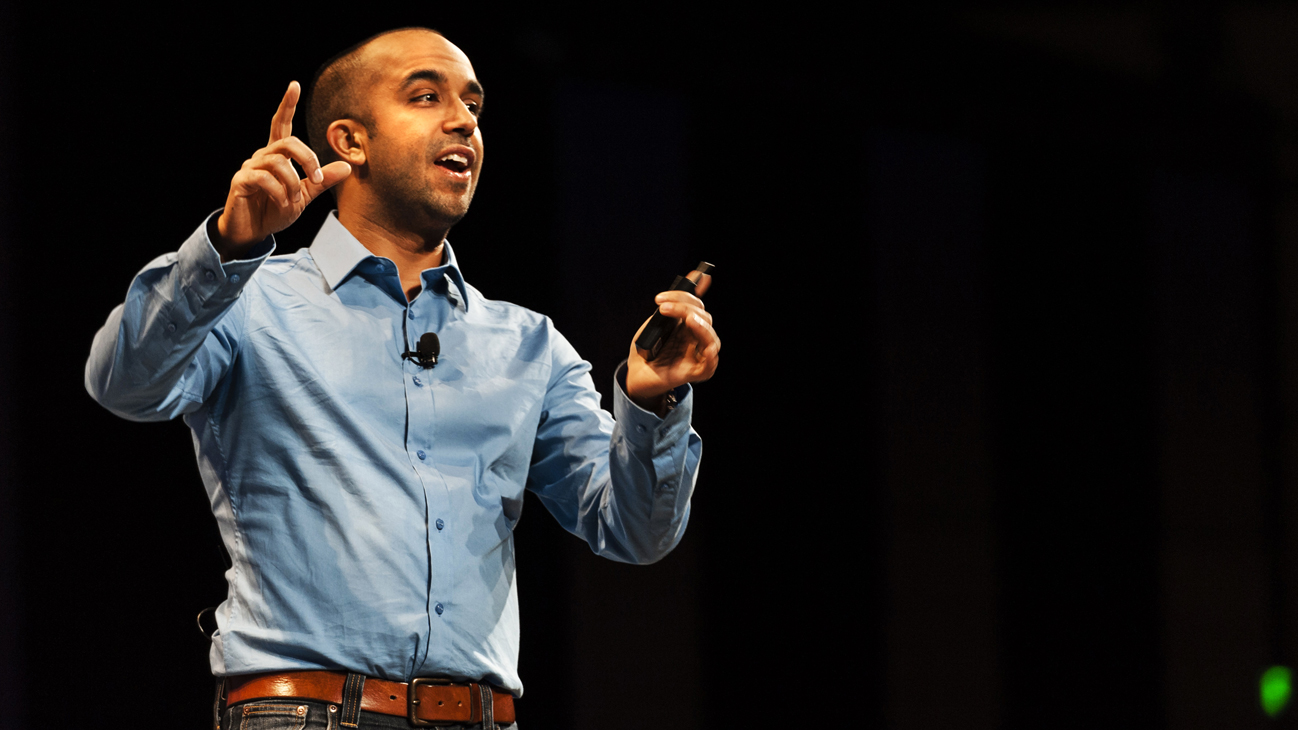In the much-anticipated follow-up to his New York Times bestseller, The Book of Awesome, Neil Pasricha’s latest book, The Happiness Equation, sees the Harvard MBA, award-winning blogger, and popular TED speaker, sharing the unforgettable principles he’s presented to organizations around the world, helping them to create more happiness in their employees to drive engagement, retention, and high-performance results. Neil’s dynamic, interactive presentations have received global praise and attention from CNN, BBC, The Today Show, the Oprah Winfrey Network, The Guardian, The Sunday Times, and many others. The Edmonton Journal spoke with Neil recently about his tips for happiness:
Neil Pasricha doesn’t waste a moment. The author of the new book, The Happiness Equation, is doing this interview by cellphone while walking up Toronto’s Yonge Street on a golden October day, on his way to several other activities.
“I’m hoping to get a 10-kilometre walk in over my next three or four meetings,” says Pasricha, upbeat and focussed. “I find it helps my thinking when I’m literally moving, and then I also end up getting lots of exercise.”
Excellent tip. Perhaps not strictly practical for people who aren’t an enormously successful, one-man-band who can conduct meetings in whatever way they choose because they are Neil Pasricha, Harvard grad, author of the million-seller Book of Awesome series.
But still, I take his point, and that of his new, internationally best-selling book, The Happiness Equation.
The point is — you can do it. Yes. You can uncomplicate your life, free up your brain, plan your time more effectively and exercise to boot. You can turn your biggest fear into your biggest success.
You can be happy. But, if you are like me and can’t remember anything unless it’s written on a yellow sticky and placed on the bathroom mirror, you’ll need guidance along the way. That’s where the book comes in.
“I could never find a guidebook,” says Pasricha, when asked why he wrote The Happiness Equation. “I found inspirational stories, I found scientific studies, but I never found a how-to manual.”
Pasricha actually penned the book for his son, as yet unborn at the time of writing. He wanted to make sure his son would know how to be happy if Pasricha were to pass away before passing on valuable life lessons. (This strikes me as unbelievably organized. Before my children were born, all I could do was worry about labour pain and having something to wear afterwards that had an elastic waist.)
So he began to research happiness, and to develop a framework based on the thoughts, advice and practises of people as wise and wonderful as Ghandi and the citizens of Okinawa (who don’t retire, by the way).
In doing so, Pasricha discovered lessons that can work for everybody, and carefully organized them in an easy-to-digest series of nine Secrets. I asked Pasricha for his personal, favourite secrets in The Happiness Equation. Here’s what he said:
Secret No. 1: The First Thing You Must Do Before You Can Be Happy
People think they need to work hard to be successful, and only then can they be happy. Pasricha says that’s backwards.
“It’s happiness that leads to great work, which leads to success,” he says. “It’s a paradigm shift.”
Of course, being happy from the get-go is hard for many people (hence the book). Long story short; if you want to be happy, simply make the best of everything, be grateful, unplug every so often and walk three times a week for 30 minutes. There you have it.
Secret No. 2: Do This and Criticism Can’t Touch You
When Pasricha first became famous after creating The Book of Awesome (which started as an award-winning blog), he found himself on a bit of a treadmill. He set many goals, including raising his blog stats and making sure his book was a best-seller.
But having achieved his goals, Pasricha didn’t feel like a better person, which made him realize that intrinsic motivators were the only things that worked. In other words, if you want to be happy, make sure you do what you are doing because it works for you, and not for others.
“I got obsessed with the extrinsic motivators, the things I couldn’t control, such as other people’s view of my book,” says Pasricha. “That’s when I went deep into the research, and found that internal motivation works, and external motivators don’t. So do it for you.”
Secret No. 6: The Secret to Never Being Too Busy Again
“Choice, time and access — if you can remove these things, it increases space in your life, space for exercise, happiness and family time,” says Pasricha.
Consider choice. We live in a busy culture, with many options available to us. Pasricha says one way to create more time is to spend less time making decisions. Limit your own options, so as not to be distracted by the trivial. U.S. President Barack Obama eliminates choice by only wearing grey or blue suits, thereby focussing his attention on the things that matter.
Similarly, time wasters such as people who blather on at meetings are the scourge of the wanna-be-happy person. And leaving too much time to complete a task is also not good, as the task expands to fill the time. Be stingy with your time.
Access is another problem. There are too many ways to get into our brains — through e-mail, texting, phoning. This leads to scattered minds and wasted time. Reduce the number of people and technologies that have access to your brain and you’ll be happier.

